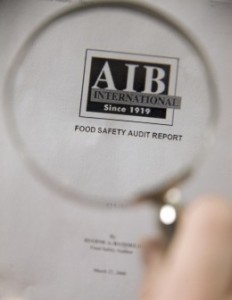Jason Clayworth of The Des Moines Register reports that Iowa, the epicenter of a nationwide salmonella outbreak that sickened thousands of people nearly six years ago, has suspended its egg facility inspections to guard against a recurrence of bird flu. While the risk may be slight, state agriculture officials say they fear that inspectors might spread the virus from one flock to another as they visit egg facilities.
 Government officials and egg industry supporters contend that suspending inspections, which stopped almost a year ago, has not compromised food safety. Farmers are still expected to follow safety regulations, some put in place after the 2010 egg recall.
Government officials and egg industry supporters contend that suspending inspections, which stopped almost a year ago, has not compromised food safety. Farmers are still expected to follow safety regulations, some put in place after the 2010 egg recall.
But critics say the lack of inspections in the nation’s top-producing egg state jeopardizes food safety for biosecurity and leaves the precautions up to corporate farm operators. And they point to the most recently available reports from federal or state inspections, done before the checks ended, to emphasize why such oversight is necessary.
Those records show:
STRAY ANIMALS: Multiple incidents of stray animals getting inside poultry houses, including one site where “approximately eight” frogs were found. Contact between poultry and other animals that can carry disease is forbidden in the facilities. That includes amphibians, which can carry salmonella and cause serious illness to humans.
REFRIGERATION: Not washing or storing eggs at appropriate temperatures at multiple facilities.
BOTCHED TESTS: Improper or no testing for salmonella as required by federal rules in at least 14 sites.
RODENTS: Evidence of rodent infestations, including
“This is jaw-dropping. I just don’t know what else to say,” said Marion Nestle, a professor of nutrition at New York University and an author of books on food safety. “The inspectors are turning up potential hazards. Why anybody would tell you with a straight face that suspending these inspections is no big deal is beyond my comprehension.”
 Oscar Garrison, a food safety executive for United Egg Producers, said stopping bird flu also impacts human health. The virus led to the destruction of more than 31 million chickens, turkeys and other birds in Iowa last year.
Oscar Garrison, a food safety executive for United Egg Producers, said stopping bird flu also impacts human health. The virus led to the destruction of more than 31 million chickens, turkeys and other birds in Iowa last year.
Garrison said he believes that suspending the inspections was an appropriate step, given the context of the bird flu catastrophe.
Other top-producing egg states have either continued to inspect egg producers during the outbreak or stopped temporarily and later resumed them, the Register found. Ohio, the second-largest egg-producing state, and Texas, the nation’s fifth-top egg producer, resumed their inspections late last year. Indiana, the third-largest, continued its inspection throughout, as did fourth-largest Pennsylvania, state officials said.
Pennsylvania officials changed their protocol after the outbreak, instructing inspectors to wait at least seven days between inspection visits to different farms. Such an alternative — or requiring inspectors to wear biosafety gear — is more sensible than suspending inspections entirely, said William Marler, a Seattle attorney whose firm represented more than 100 victims of the 2010 nationwide salmonella outbreak whose origins were traced to Iowa.
“Given the black eye Iowa’s egg production got in 2010, it just seems shortsighted to suspend the inspections,” Marler said. “It sends a completely wrong message to consumers.”
In 2010 eggs contaminated with salmonella from Wright County Egg showed up in 23 states and resulted in a recall of 550 million eggs.
 The government reported that at least 1,939 cases of illness were likely associated with the outbreak. But some believe the number to be more than 50,000 people, citing Centers for Disease and Prevention reports that estimate that for every reported illness, more than 38 go unreported.
The government reported that at least 1,939 cases of illness were likely associated with the outbreak. But some believe the number to be more than 50,000 people, citing Centers for Disease and Prevention reports that estimate that for every reported illness, more than 38 go unreported.
Austin “Jack” DeCoster and his son, Peter, were sentenced in April to 90 days in jail and fined $100,000 each for their role in the outbreak.
Their trials brought to light what federal officials said was a deliberate and routine effort to avoid proper health regulations. That included falsifying paperwork to a firm that inspected the plant. On the eve of each audit, workers were given blank, signed audit forms and told to fabricate data for the report, prosecutors said.
After reports of human illness, regulators made findings that included rodent infestations and as much as 8 feet of manure beneath some of the facilities.
 School officials said on Thursday, schools reported an abrupt increase in students reporting symptoms of vomiting.
School officials said on Thursday, schools reported an abrupt increase in students reporting symptoms of vomiting.












